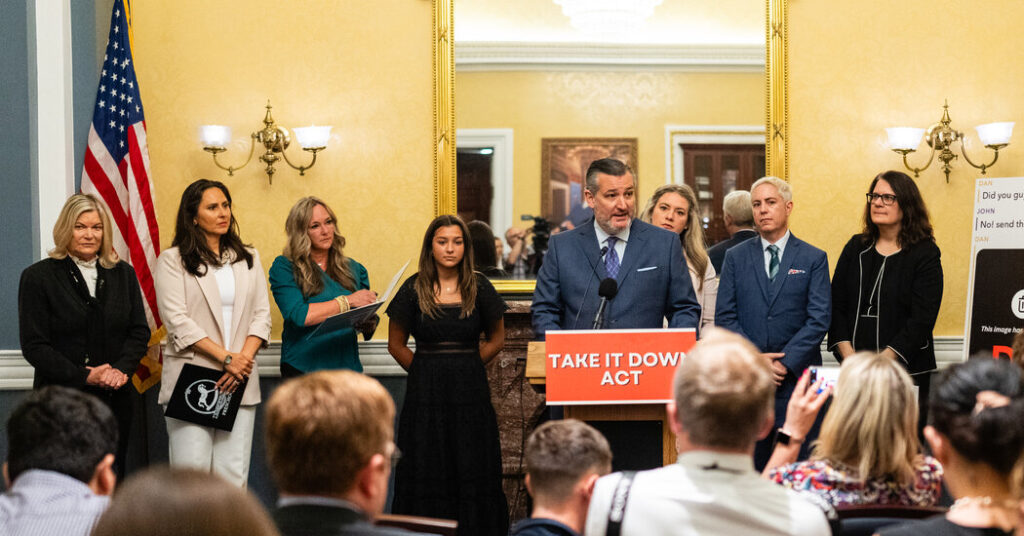On Monday, the House approved a bipartisan bill aimed at making it illegal to share sexually explicit images and videos of individuals without their consent. This includes A.I.-created content referred to as “deepfakes.” The legislation also requires platforms to promptly remove such content.
The vote, which was 409 to 2, sends the bill to President Trump, who is expected to sign it into law swiftly.
Known as the Take It Down Act, this law seeks to address the issue of “revenge porn” by mandating that social media and online platforms eliminate such material within two days of receiving notifications.
The bill has garnered an unusual alliance of support from both conservatives and liberals, passing through the Senate unanimously in February. President Trump’s endorsement, which he mentioned during a recent address to Congress, has likely aided its passage.
Introduced by Senators Ted Cruz, a Republican from Texas, and Amy Klobuchar, a Democrat from Minnesota, this is the first piece of internet content legislation to be passed by Congress since 2018, when lawmakers initiated efforts against online sex trafficking. While focusing on revenge porn and deepfakes, the bill is viewed as an important stride towards holding internet companies accountable, which have largely evaded government oversight for many years.
Senator Klobuchar mentioned that she discussed the bill with President Trump and First Lady Melania Trump during a luncheon on inauguration day.
She expressed her concern for families whose children suffered from bullying, harassment, or emotional distress due to these explicit images.
In an interview, Klobuchar reflected that this bill represents a significant achievement in addressing consumer technology challenges.
The strong support for the Take It Down Act underscores growing frustration among lawmakers towards social media platforms like Facebook, Instagram, and X for facilitating harmful content, especially those impacting minors.
While revenge porn and deepfakes can affect both adults and minors, they are particularly problematic for teenage girls due to the proliferation of “nudification” apps that enable boys to create and share inappropriate images of their classmates without consent.
Representative María Elvira Salazar, a Republican from Florida who introduced a related measure in the House, emphasized that the bill aims to curb the rampant abuse and harassment of young girls online.
“It’s despicable to manipulate and humiliate vulnerable young females using their images for personal gratification or vengeance,” Salazar stated.
The passage of the bill resonates with similar legislative actions at the state level. Except for South Carolina, every state has some law against revenge porn, with at least 20 states addressing sexually explicit deepfakes.
This new legislation reflects a long-standing bipartisan initiative to tackle the issue of deepfake pornography. Cruz and Klobuchar first proposed it last year, when it cleared the Senate but stalled in the Republican-controlled House. This year, it gained traction after receiving support from Mrs. Trump, who has advocated for youth mental health, cyberbullying, and social media impacts.
Representative Alexandria Ocasio-Cortez, a Democrat from New York, also put forward legislation last year that would allow individuals depicted in sexually explicit deepfakes to sue those responsible for creating and distributing them, though that bill hasn’t re-emerged this year.
In recent years, lawmakers have supported various bills aimed at safeguarding children online from sexual exploitation and unhealthy online behaviors. In January 2024, executives from companies like Meta and TikTok were called to testify before lawmakers, facing tough questions about their platforms.
During the hearing, Meta’s CEO, Mark Zuckerberg, publicly apologized to parents affected by online dangers.
However, some advocates for free speech caution that this law could inadvertently hinder free expression, potentially leading to the removal of legitimate content alongside harmful images.
“Good intentions do not offset the bill’s potential impacts on online speech and privacy,” warned Becca Branum, deputy director of the Free Expression Project at the Center for Democracy and Technology.
Branum added that the Take It Down Act may create opportunities for misuse, jeopardizing progress against image-based sexual abuse.
Only two Republican representatives opposed the bill: Eric Burlison from Missouri and Thomas Massie from Kentucky. Massie expressed his belief on social media that the legislation presents a “slippery slope with potential for abuse and unintended consequences.”


